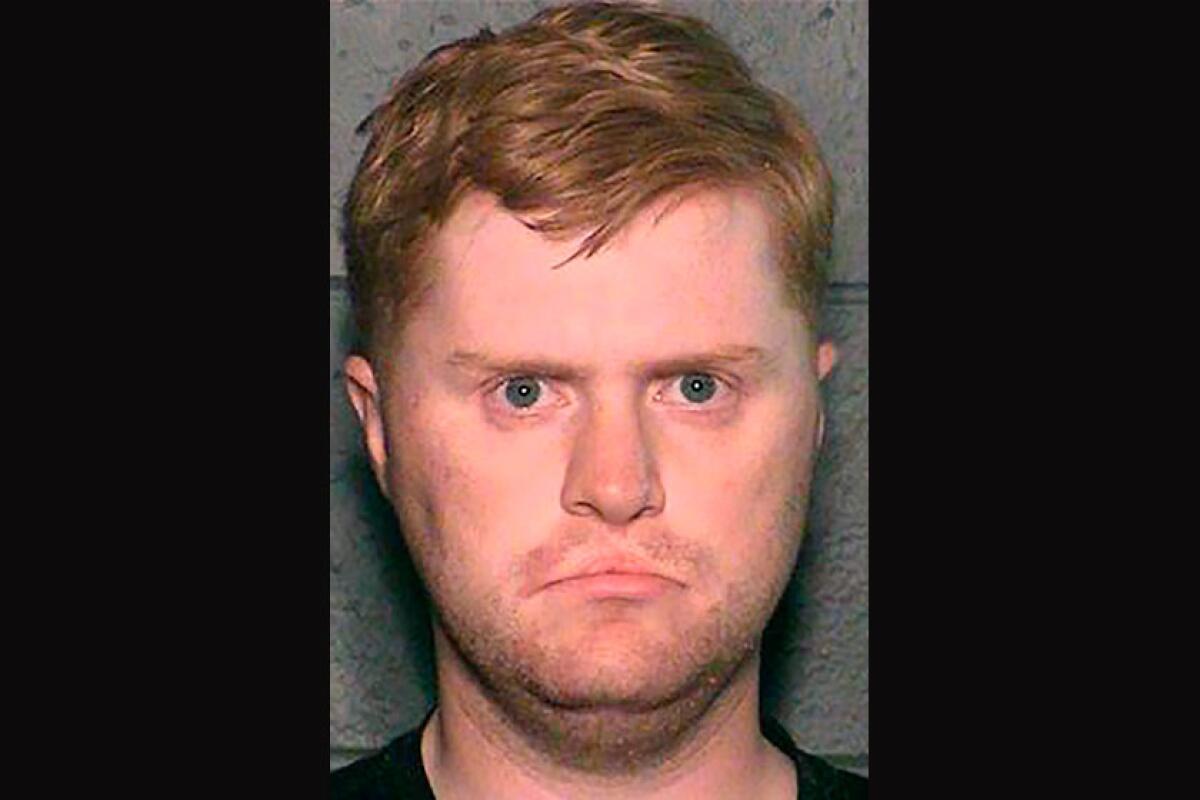Ex-soldier in Kansas with neo-Nazi links sentenced to 2½ years in bomb plot

- Share via
TOPEKA, Kan. — An ex-soldier described by prosecutors as a satanist and linked to a neo-Nazi group was sentenced Wednesday to 2½ years in federal prison for distributing information through social media about building a bomb and making napalm.
A federal judge rejected a request from Jarrett William Smith’s attorney for a lenient sentence of 15 months in prison followed by three years of supervised probation. Federal law called for a sentence of up to 20 years in prison and a fine of up to $250,000, but sentencing guidelines said the presumed punishment for a first-time offender like Smith was 2½ years to a little over three years in prison.
U.S. District Judge Daniel Crabtree also ordered the three years of supervised probation for Smith after his release from prison. The judge said he was surprised that federal sentencing guidelines called for such a “low” prison sentence for “troubling and serious” criminal behavior, adding that Smith wanted to start a race war and shared on social media “multistep plans to create chaos.”
“His planned actions, if executed, would have endangered countless members of the public,” Crabtree said from the bench.
In seeking the lighter sentence, Smith’s attorney said that because of a cleft lip and palate, Smith had endured a lifetime of victimization, isolation and trauma, which led him to become involved with online extremist groups. The Anti-Defamation League has said Smith was associated with the neo-Nazi Feuerkrieg Division, which it says advocates for a race war and promotes some of the most extreme views of the white supremacist movement.
Smith, 24, was a private first class stationed at Ft. Riley, Kan., when he was arrested last year.
Federal public defender Rich Federico said Smith lacked the basic knowledge to actually build explosive devices and was often “just regurgitating” what he’d seen online.
“He’s not far removed from adolescence,” Federico told the judge. “He is particularly vulnerable to extremists online.”
Prosecutors argued that Smith admitted to providing information about making explosives to an FBI undercover agent in September 2019 and that FBI bomb technicians determined that his recipes were viable. He pleaded guilty in February to two felony charges of distributing explosives information and admitted that he intended for it to be used.
Prosecutors said that Smith planned to overthrow the government, with attacking a news organization as a first step. They said he told an FBI agent that he distributed explosives information “for the glory of his satanist religion,” though they provided few other details.
Federal investigators have said Smith had encrypted communications with a Missouri man who this year planned to bomb a Kansas City-area hospital because he was distressed by the government’s response to the coronavirus pandemic. That man killed himself in March during a firefight with FBI agents as they served an arrest warrant, according to the FBI.
Smith admitted in his plea agreement that he spoke to others about his desire to travel to Ukraine to fight with “a violent, far-right paramilitary group.”
Smith previously was stationed at Ft. Bliss, Texas. He was discharged from the military after pleading guilty to the two charges.
Federico said in a court filing that Smith endured a near-daily barrage of bullying as a child and had repeated, painful reconstructive surgeries.
In 2010, when he was a freshman in high school, Smith learned he had been on a classmate’s “hit list” as the intended target of a school shooting and bomb plot. The attempt was thwarted.
“That has a huge impact on who you are,” Federico told Crabtree on Wednesday.
But Assistant U.S. Atty. Anthony Mattivi countered that Smith wasn’t examined for or diagnosed with a mental illness.
“What the defendant experienced is sad, and I have sympathy for him,” Mattivi told the judge. “But it has to be balanced against what he did.”
More to Read
Sign up for Essential California
The most important California stories and recommendations in your inbox every morning.
You may occasionally receive promotional content from the Los Angeles Times.










